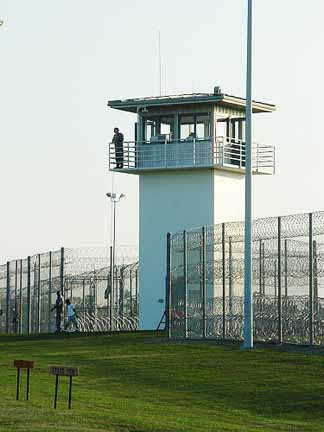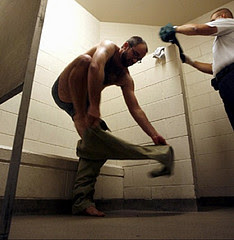Being a Prison Guard Imprisoned Me
June 12, 2014

For a change of pace,
we present
the reflections of a reader,
facing retirement after
25-years as a prison guard.
by Ted Freeman
(henrymakow.com)
I am a 51-year-old man who is going to retire in three months after 25-years on the job. No, I'm not independently wealthy. All I have is a small pension to look forward to. But I need to leave my job. I need to do something different because I feel as though I'm going insane.
Most state workers can retire at the age of 60 with 30 years of employment. But, I am a corrections officer at a state prison so they have a different set of rules for us due to the stress and high rate of burnout.
I started my corrections career at the age of 25, so I am now eligible to retire. I will leave as soon as I can.
Before I became a corrections officer, I worked in retail; a job I held from the age of 15. The job had its stress but I really enjoyed it. I could be creative and imaginative. I felt productive.
I was entrusted with thousands of dollars in cash and supervised other employees. I got to know my customers and they got to know me. I provided terrific service. That aspect of the job was particularly important to me.
But when my employer told me that I wouldn't be getting any more pay raises, it was time to look for something else. After all, I had a wife and three sons to provide for.
As a young man without a college education my choices were limited. I considered several private companies but none of them paid well enough. That's when I turned to state employment.
Working inside a prison wasn't my first choice but it paid the best and provided good benefits. So, I applied and eventually landed the job.
It wasn't quite as I expected. All I knew about prisons was what I saw in the movies. So, needless to say, the transition from a customer service oriented job to working with convicted felons was challenging.
PRISON GUARD
My first assignment was in the Disciplinary Segregation Unit. It's the place where we send inmates who commit a major rule violation. It's not a pleasant place to work. I had never been so disrespected in all my life. Frankly, I was shocked at the vile, vicious and debase things I saw and heard.
After getting over the initial shock, I quickly became jaded and grew a thick skin; one has to in order to survive in those conditions. But it has its price.
As corrections officers we not only deal with disrespect from the inmates but we have to deal with the mass brawls, the sexual activity, the shit bombs, the brutal assaults, the warning shots, the take-downs, the lock-downs, the shake-downs, the unabashed disregard for others, mental illness, and the deceit and manipulation, but we have to deal with some other very distasteful aspects of prison culture.
 Ordering another man to remove his clothing so that I can inspect his nether regions for contraband is probably most disturbing thing I've ever had to do. It's so completely unnatural and out of the realm of anything normal that it still unnerves me after 25 years.
Ordering another man to remove his clothing so that I can inspect his nether regions for contraband is probably most disturbing thing I've ever had to do. It's so completely unnatural and out of the realm of anything normal that it still unnerves me after 25 years.I once had to conduct an unclothed search on a person who was in the middle of a male to female gender reassignment. There is nothing as ghastly as black chest hair growing on fully developed breasts. That visual will always haunt me.
All of this has taken a toll. I have become distrustful of people and I can be indifferent to the needs of others. If I see a man with tattoos on his arms and neck I automatically assume that he has done time somewhere.
I don't like people walking up behind me, not even a young mother pushing a grocery cart who is just quietly shopping. I will reposition myself so that I am facing the person. When I go to a restaurant I will instinctively and automatically sit with my back to the wall and my face to the door. No matter where I may be, I am always aware of my surroundings, scanning the scene and looking out for those who might be dangerous.
I also get irritated at the slightest mishap or perceived disrespect and will oftentimes react in irrational and unproductive ways. I see this hyper-vigilance and hyper-sensitivity in myself and I don't like it. I'm not nearly as happy-go-lucky as I used to be and it's distressing to me. Over the years I have learned different ways to cope with the negativity in my job. Some good, some not so good.
I am one of the fortunate ones that didn't develop an addiction. I know of a few coworkers who abuse illegal and prescription drugs. But many use alcohol as a means of survival.
SEEKING BALANCE
In the struggle to balance my life, I recently read a book by the Dalia Lama called, "The Art of Happiness." In it he talks about being happy and fulfilled in the midst of unhappiness. He said we need to view people as humans who are full of faults and foibles. By doing so, we will feel compassion which in turn will bring happiness.
Also, in the Bible, I recall Paul saying, "Finally, brothers and sisters, whatever is true, whatever is noble, whatever is right, whatever is pure, whatever is lovely, whatever is admirable--if anything is excellent or praiseworthy--think about such things."
All of this is terrific advice but for some reason I'm having trouble reaching that goal. So, this is where I'm stuck.
How do I go from viewing everyone as a potential threat to viewing them as human when my experience has taught me that danger could be lurking around the corner? How do I think about pure and admirable things when surrounded by unholy and unpleasant things?
It easier said than done, especially when someone purposely tries to harm me. How do I just brush off the "injustice" and think positive thoughts?
Maybe after I retire, I will be able to decompress and return to a normal state of mind. But I have to wonder if this antagonism and distrust will always be a part of me.
----
I asked Ted if he had uplifting experiences in his prison career:
Yes, I have had many uplifting experiences working at the prison. It hasn't been all bad. Some inmates don't give a shit about anything. There's not much that can be done with them. But there are others who truly regret what they have done and are taking steps to correct their thinking errors so that they won't ever put themselves in prison again. It's these inmates that I can have a decent, normal conversation with and with whom can have a positive influence.
Hearing their stories I gain insight into a different world. Then I will relate to them some of my life experiences (but not in detail as we're not supposed to become too personal with the inmates) and what I learned and what I changed to make things better. I try to give them another perspective and different way of thinking.
I've had inmates thank me for listening to them. It's not very often they get to express themselves so freely. They know I can be trusted with their inner most thoughts. I've also had inmates apologize for being disrespectful, which I graciously accept.
Here's a little something that's kind of off-topic; A number of years ago I was supervising a crew of eight inmates doing a special project. When lunch arrived we all sat around a table and began to eat. We were laughing and joking when it suddenly occurred to me that all eight of the men were in prison for murder.
The thought took my breath away for a moment but then I had to chuckle.... if someone had told me that someday I would having lunch with a bunch of convicted murderers, I would have called them a liar.
The interesting thing about it was, I never felt afraid, intimidated or threatened by any of them. In fact, most murderers are very easy to supervise. They usually mind their own business and don't get mixed up in prison politics. It's the druggies and sex offenders who are the most challenging. They are the most manipulative of all inmates.
----
Here's some raw footage of prison officers restraining an inmate. It appears that the officers conducted themselves in a professional manner, ie: no cheap shots and they used only the amount of force necessary to restrain the inmate and control the situation. http://www.youtube.com/watch?
Here's one more video of a jail officer being attacked by an inmate but is saved by other inmates. http://www.youtube.com/watch?
First Comment by Al Thompson:
One night I was in the Sacramento jail, and a guard woke me up at 2:00AM to give me my mail. It was legal material, and so he had to open it up in front of me. So I asked him "How is your day going?" He said something like: "I'm in jail." And I told him that he gets to go home every evening. He said: "No, I'm in jail and it is not much different from you."
Working in a prison system will destroy a man. While "serving" six years in jail, I found that the guards were crazier than the inmates. Of course, I would go as far as saying that anyone who works for government or a religious group is setting themselves up for failure because they have no other skills that they can market. I'm hoping that someday government and religion will be a thing of the past. I believe in God, but I don't believe in religion.
Ted had a better start in the retail line of business, because you have a lot of different factors in running a shop. In prison, you are doing work that most people would never want to do and it is a job where there is no happiness.







David said (June 13, 2014):
G. Gordon Liddy of Watergate infamy did a stretch in prison and later had his own radio show. He often asked why any sane person would choose to be a prison guard and voluntarily enter a penitentiary every day of their adult life, when there is a free world out there to enjoy. I can't understand such a mentality either.